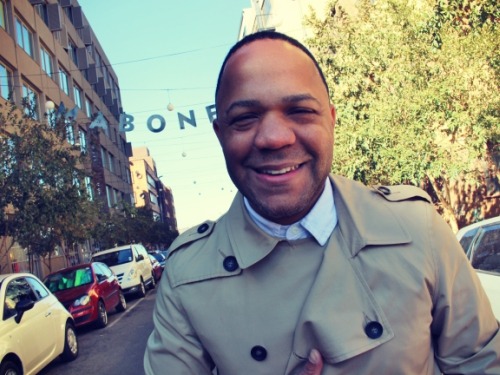
EQ is no longer the latest buzzword in business branding, there is now a hot new concept, and that is Personal Brand Quotient (PBQ) – which for the uninitiated is using your personal brand to influence the world around you. This is the focus of motivational speaker and author Timothy Maurice Webster’s, latest offering, Personal Brand Intelligence (PBQ).
The concept is about helping people to realise their brand influence potential. “The more intelligent your brand is – the more well-structured, well-positioned it is – the more influence you have,” he says.
“Like EQ (Emotional Intelligence) PBQ is a way to create awareness of your personal brand potential,” he says.
Webster is a long-time authority on everything personal branding related. Following on his first three offerings, Soul to Sole, Personovation and Thinking About YOU – his latest book takes the concept of branding a step further, and explores how the mind works, how individuals function, how the subconscious mind can be leveraged and how you can take control of parts of the mind that may have been overlooked.
“This book is twofold – it’s a collection of my thoughts over the last eight years as well as additional content about structuring your brand. I think the book is going to be very surprising for people because it’s not your typical conversation about personal branding.”
“Up until now, most people thought they’d have to be famous to be a brand or to see themselves as having a big influence”
SME South Africa caught up with Webster to find out what personal brand intelligence really means and the biggest personal branding mistake most professionals and entrepreneurs make.
Personal Brand Intelligence by Timothy
Maurice Webster (Paperback).
Q: What is personal brand intelligence really about?
In my first book in 2006, I introduced the idea of personal branding in a book called ‘Thinking About You’, and after I wrote this book I realized that creating a narrative, creating a storyline, creating a position of influence for yourself that you share with the world is critical but people often get stuck in an old narrative.
Ten years later, this book speaks to the ability of the individual to create influence and to create it in a way that is highly intelligent and influences the world.
Q: In what way does PBQ make you more aware of your personal brand potential?
Most people aren’t aware that as individuals we’re in a chapter in history where we can create unprecedented influence for ourselves. So being able to see how your brand is structured helps to demystify the notion of being a brand.
There are 3 ways you can structure a brand – understanding the unseen dimensions; the theme – which is the image and so forth; as well the third, which is the networks dimension. Up until now, most people thought they’d have to be famous to be a brand or to see themselves as having a big influence, but what’s happened now is that everyone understands that they can be a brand and influence their environment, whether it’s 100 people or 100 000 people.
Q: What will people find most surprising about PBQ?
There are various findings, for example, why emotions override logic when there is a deep alignment of values. So when someone absolutely loves an artist or loves a pair of shoes they often override logic around paying bills and they will go and buy the shoes or go to a concert. So, helping people understand why we as human beings do these types of things is important.
“I think it’s really critical that young people understand the short-term challenges that they face and put them in the context of their long-term vision for their brands instead of being stressed by their short-term frustrations”
I speak about that in the chapter around the Endowment Effect. So the Endowment Effect really helps people understand why specifically, people do what they do relative to the emotions and how you can leverage that, and also to understand your relationship with your own emotions.
Q: What are some of the biggest mistakes that young professionals and entrepreneurs make in terms of personal branding?
Thinking short-term. There’s a term called affluenza, which is to constantly compromise your values to appear wealthy and successful. So you make short-term decisions that don’t suit your long-term goals.
The most powerful brands have often been around for a very long time. When Facebook launched for example, even though it’s a relatively new millennial-style brand, they had to start with one friend, and they’ve built themselves to 1.6 billion people on their platform. I think it’s really critical that young people understand the short-term challenges that they face and put them in the context of their long-term vision for their brands instead of being stressed by their short-term frustrations.
Q: What are the 5 key learnings in Personal Brand intelligence that you want readers to come away with?
1. The first thing is that even though we are in a different era, we still carry over irrational thinking from previous generations. So, for example, racism is a historical dynamic that is still carried over. So even though the systems that set up racism no longer exist, racism continues to hang around like a cloud from the past.
So the same thing happens with personal branding. People believe that only certain people are chosen to be able to have influence.
-
See also: Brand your business to success
2. Secondly there is a structure for how you should build your brand and I break down the structure and I help people understand that it’s critical to be focused on all three areas of the structure.
3.Thirdly when you have structured your brand, understanding which area you are strong or weaker in is really important to get people around you, your advisors, teammates and so forth to help you work on building and sustaining that structure.
4. Realize that you have the power to be able to use online platforms – to really influence your world and get paid for it. To structure yourself, to structure your brand in such as way that you create revenue streams, you create power and equity for yourself to be able to make a fundamental difference.
5. The final point, I think it’s important that people read the book with an open mind because they are going to learn a lot when it comes to human behaviour, beyond structure, beyond self-help.
The book is available online from: www.takealot.com and will be available at selected Exclusive Books and CNA stores from 1 July 2016. The book can also be ordered by sending an email to: books@ndalomedia.com


